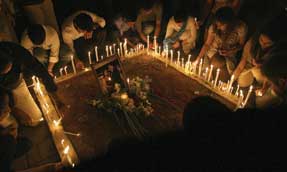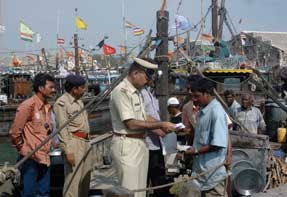Magazine
Turning the Other Cheek

Our Mumbai columnist ponders on the wages of inaction against yet another terrorist attack on India's most vibrant city.
|
India missed the boat. Both literally, and by way of a damning metaphor. The dinghy which ferried the Pakistani terrorists and their weapons through Indian waters to the fishermen’s village in downtown Mumbai last November, somehow escaped the attention of our Navy and Coast Guard personnel. Or so, the government would have us believe. After all, the country’s coastline stretches over thousands of kilometers and our resources are limited, our protectors tell us with a wistful sigh.
Has the average Indian citizen swallowed this shameful explanation? Is he convinced that nearly a dozen persons from a neighboring country could literally sail through our intelligence and security systems – a major and crucial component of our defence infrastructure – and ant up a huge cache of arms and ammunition in a five-star hotel room in a previously targeted city without the active connivance of local officials? Or is he waiting for a more sinister scenario to unravel in the subsequent investigations – namely, that men and material were smuggled in after marine and border security officials were handsomely bribed, much like their (now convicted) predecessors at the Konkan check-points who let in the RDX explosives, which blew up several parts of Mumbai in March 1993? If Mumbai ever builds a 26/11 museum on the lines of the commemorative project for the 9/11 victims at New York City’s Ground Zero, that little nondescript dinghy should find an exalted destination. What better symbol of India’s most disgraceful intelligence and security failure in recent times? And what better reminder of two missed opportunities – first, to eradicate or at least contain the terrorist menace; and second, to overhaul our domestic polity – that also went abegging. The immediate aftermath of the 26/11 terrorist strikes in Mumbai was the most opportune moment to strike at the very root of that terror. Which, in this case, means the terrorist training camps and hideouts in Pakistan-Occupied Kashmir (POK) as well as in Pakistan itself. India has stood and watched with impotent rage as terrorists have kept striking at its people with unchallenged impunity and got away with mass murder for over two decades. The U.S. State Department’s annual report ranked India, which recorded 2,300 deaths to terrorism in 2007 among the “world’s most terror-afflicted countries.” How long are we to issue “strong” official statements from the Prime Minister’s Office condemning such acts that “will not be tolerated,” when all we do in reality is to continue tolerating them? Walk the talk, and stop spouting ridiculous platitudes. Every available shred of evidence, including the testimony of the lone terrorist Ajmal Amir Kasab, who was captured alive, points to a Pakistani hand in the attacks. The flood of incontrovertible clues forced even the Pakistani government, which denied any link to the attack, to concede that the pepetrators are non state Pakistani actors, some of whom have since been put under “house arrest.” There is clear justification for “surgical air strikes” at specific targets in Pakistan to dismantle and demolish the apparatus that spawns, nourishes and sponsors terrorists and their despicable acts. Any military strategist worth his brass will attest to the fundamental rule-of-thumb that surprise is a key factor in devising an offensive strike. Issuing threatening statements without backup action allows the enemy time to mobilize resources and prepare for an attack. The Indian government did just that, and played into Pakistan’s hands. The Pakistanis drummed up the canard that any attack from India would force them to shift troops from the Afghan border to the Indian one, thus prompting the US government (keen to ensure no let-up in its “war against terror” against the Taliban) to fly in Secretary of State Condoleeza Rice to the sub-continent with the stated purpose of defusing tensions. In effect, Pakistan played for time and won. The global outrage gave wide latitude to the Indian government for targeted offensive strikes. New Delhi had broad domestic support for decisive action. And largely because citizens of 11 nationalities fell victims to the terrorists’ bullets, world opinion was in our corner as well. US President-elect Barack Obama summed it up when he pointed out that every sovereign nation has the right of self-defence, and therefore would be justified in striking back. However, a coterie of intellectuals and peace activists began a chorus denouncing the military option as emanating from “hawks, hotheads and jingoists,” and endorsing the Congress government’s no-action stand as mature restraint. Some sagely cautioned the government against adopting the militaristic posture that led the United States into the disastrous invasion of Iraq after 9/11. But there is an obvious difference between the two attacks. The Weapons of Mass Destruction (WMDs) we are facing are real, not imaginary terrorists – and so is the havoc they have wreaked on our people. While a passive form of “Gandhigiri” is touted to solve the terrorism problem, there is also talk of “coercive diplomacy.” But the half-baked Gandhians got their comeuppance when it was revealed that the Mahatma, when approached by the then Indian Army Chief Kodandera Madappa Cariappa to deal with the marauding Pakistanis in 1947, in fact told the general that he should follow his dharma (duty) as a soldier and defend India at all costs. Political Anger
Soon after the Mumbai attacks, public anger against the country’s politicians reached an unprecedented peak. It was fuelled by several incidents: • Gujarat Chief Minister Narendra Modi, despite being warned against it, chose to grandstand before a handful of his supporters next to the Taj Palace Hotel even as the attacks were ongoing inside the building. He told them (as well as the byte-hungry television cameras) that his state administration would donate Rs. 10 Million ($200,000)to the martyrs – considerably more than what the Maharashtra Government offered. It was a crude and naked display of political oneupmanship by the BJP honcho against the Congress state administration in Maharashtra. • What got the public’s goat was that the very same right-wing Hindu politicians (Modi, L.K. Advani, Bal Thackeray, among others) who had riled against Anti-Terrorist Squad Chief Hemant Karkare for his unrelenting pursuit of the saffron brigade during his probe of the Malegaon blasts, were now singing his praises in death. Not surprisingly, Karkare’s widow refused to see Modi when he paid her a condolence visit, and also rejected his monetary reward. • News that the commandos who cleaned out the terrorist-affected spots in Mumbai at great risk to life and limb, came from all regions of the country also sparked outbursts against Raj Thackeray whose campaign against non-Marathis living and working in Mumbai has won him political brownie points. Noting that the man himself was nowhere to be seen in public during the attacks, people were quick to point out that it was left to the likes of Major Sandeep Unnikrishnan (a Malayali raised in Karnataka state) and others from Himachal Pradesh, Bihar and Delhi to defend a traditionally multi-racial city at the cost of their lives. • Miffed at being turned away by Unnikrishnan’s grieving father, Kerala Chief Minister G. Achhudanandan remarked most callously that if it were not for the son’s death, not even a dog would care to step into the Unnikrishnan home. • BJP’s token Muslim leader Mukhtar Abbas Naqvi put his foot unerringly into his mouth when he declared on national television that fashion-conscious city-bred women who wore lipstick and other accessories had no right to protest on the streets against politicians. • Patil’s boss, Chief Minister Vilasrao Deshmukh, met a similar fate. Opting to sight-see the badly damaged Taj Palace Hotel a day after the grenade and gunfire attacks, Deshmukh chose to include in his touring party his Bollywood comedian son Ritiesh and film-maker Ram Gopal Varma. Wags wondered if Varma’s next potboiler starring Deshmukh Jr. would be titled Picnic at Taj Palace. • State Revenue Minister Narayan Rane, a local politician who had earlier strayed from the Shiv Sena to the Congress and now expected to be named the new chief minister of Maharashtra, rebelled publicly when he was deprived of the post. In retaliation, he also threatened to name politicians who, according to him, had colluded with the terrorists in the attacks. In a swift response, a social activist filed a Public Interest Litigation (PIL) against Rane demanding that he name the concerned persons as the allegation of providing logistical and financial support to terrorists had national-security implications. • The country’s rulers were not spared the scrutiny and the ridicule after news reports exposed that the budget for providing security to Prime Minister Manmohan Singh and the Sonia Gandhi family was increased from Rs. 11.7 billion ($234 million) last year to Rs. 18 billion ($360 million), while that for the National Security Guard (commandos assigned to protect the general population from terror attacks) was actually cut by Rs. 10 million ($200,000) to Rs. 15.8 billion ($316 million). • Add to this, the disclosure that an additional Rs. 25 billion ($500 million) has been allocated to protect politicians of various political parties. And scandalously, among those enjoying the cover is a certain Mr. Sajjan Kumar who has murder cases pending against him. Kumar is no exception. National Election Watch, an independent monitoring company, has documented that one out of every five legislators elected in the recent state-level polls is tainted with a crime-ridden past, and that between 2003 and 2008 – an entire national-level electoral cycle – the wealth of candidates countrywide grew by 400 per cent. For a few days in the week following the Mumbai attacks, the world witnessed a rare phenomenon: Indians, especially Mumbaikars, taking to the streets protesting against their politicians and their system of governance. It raised hopes of a revolution of sorts. But tragically, it petered out, leaving behind some gnawing questions: Was the outrage restricted to the elitist South Mumbai community, which was most affected given their preference for five-star socializing? Was it deep and powerful enough to impact other social classes in less urbanized parts of the country often labeled the other India? Whatever the reason, the nation missed the boat on an historic double opportunity – to strike a blow both against terrorist camps in Pakistan and against corrupt and inept politicians at home.
|



You must be logged in to post a comment Login